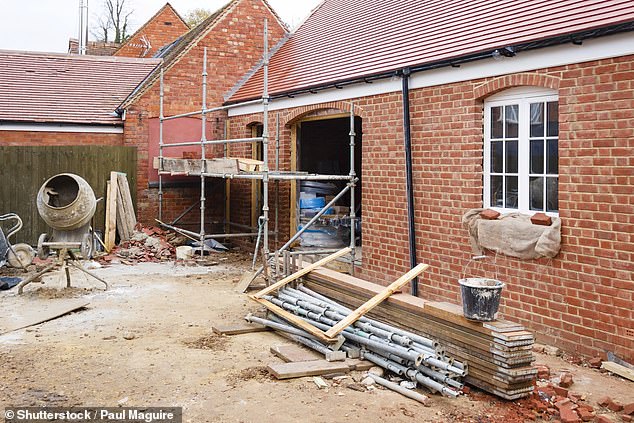My mum, who is 88, is currently living in her own home, which is worth £395,000. She has an equity release mortgage on it of £95,000.
Very soon she will be needing full care and my husband and I would like to build a granny annexe for her to move into, so I can look after her.
I would like to ask about the implications of selling her house to help fund the build of the granny annexe and what that would mean from a tax/inheritance point of view?
My dad passed away four years ago and it’s just myself, the daughter, and my brother who lives in New Zealand.
S.R, via email
SCROLL DOWN TO ASK YOUR FINANCIAL PLANNING QUESTION

This reader wants to build a ‘granny annexe’ so that she can care for her 88-year-old mother
Harvey Dorset, of This is Money, replies: The cost of full-time care is considerable, and can quickly wipe out any money tied up in an estate.
Those, like your mother, who have assets of more than £23,250, must fund their own care, meaning that the vast majority of care seekers are self-funding.
Already, self-funding care seekers can expect to pay an average of £1,291 per week for full-time care. In some regions, the cost of care is much higher.
Over the course of months or years, this can add up to an enormous care bill.
Therefore, building a granny annexe and choosing to care for your mother yourself could be a good way to prevent your mother from losing all of her money to care costs.
At the same time, doing so means that you can spend much more time with your mother in her later years, and can give you the peace of mind that she is safe and being properly cared for.
However, funding the building of a granny annexe using the proceeds of your mother’s house sale is where you could run into problems.
This is Money spoke to two financial advisers to find out what you need to know to avoid any unexpected issues that might arise when looking to build a granny annexe.
Ian Dyall, head of estate planning at Evelyn Partners, replies: There are a number of issues to consider, including the tax treatment of the gift, what would happen if your mother subsequently needed more care than you can provide at home, and how investing in an illiquid asset, such as your home, will impact on what you and your brother ultimately inherit from your mother.
Let’s start with the tax issues.
There are three taxes to consider here: capital gains tax, inheritance tax and pre-owned asset tax, which is a form of income tax introduced to combat inheritance tax avoidance.

Ian Dyall warns that the reader’s mother may be seen as benefitting from the money she gifted to fund the annexe
Generally, any gains you make on the value of your home are exempt from capital gains tax, so there is unlikely to be a liability on any profit your mother makes when she sells her home. It also looks like your mother may not have an inheritance tax liability.
Each individual has a nil rate band (NRB) of £325,000 and an additional residence nil rate band (RNRB) of £175,000.
However, the residence nil rate band can only be used against the value of your home, it must be left to children or grandchildren and if your estate exceeds £2million on death the allowance tapers away.
If you don’t use your nil rate band allowances on death they can be transferred to your surviving spouse.
Based on the above, and taking into account any transferrable allowances from your late father, your mother may have allowances of £900,000 made up of two nil rate bands and two residence nil rate bands (capped at the value of her property after deducting the mortgage). This may well cover all her assets.
For inheritance tax purposes, if you make a gift, it will only be effective in reducing your liability if you cease to benefit from any use of the assets you gift, and you survive the gift by seven years.
In your mother’s case, by living in a property funded by the gift she makes, she may be seen as benefitting from the money she has given you, in which case the gift will still be part of her estate for inheritance tax.
Alternatively, she may be caught by the pre-owned asset tax (POAT) legislation, which would mean that she has an income tax charge to pay on the perceived rental value of her occupation of the annexe.
There are a number of ways to avoid this.
She could pay you a market rent, although you’d then pay income tax on that rent. She could elect to have the money she has given to you treated as though it is still part of her estate for inheritance tax.
This may be a good option if she has no inheritance tax liability.
Alternatively, you could give her a share of the property corresponding to the amount of money she contributes.
There would then be no gift as her estate has not reduced in value. This may also help if she wishes to leave some money to your brother on her death.
Let’s look at the care fees issue. Further down the line, if your mother’s health deteriorates to the point where she needs care in a nursing home, the local authority will undertake an analysis of how much should be funded by the local authority and how much by your mother.
Different local authorities have different approaches when considering gifts made when a need for care was looking likely.
The gift from your mother to you could be seen as ‘deliberate deprivation of assets’, in other words, giving money away deliberately to try to secure greater funding from the local authority.
If they are found to be deliberate deprivation, your mother’s gift would still be included when calculating her contribution.
Giving your mother a share of the property in return for her contribution would avoid this, as there would not be any reduction in her assets, but they may still take her share of the property into account when calculating her contribution, so you still need to consider how you would pay for that care should she need it, particularly where the money is tied up in an illiquid asset, like property.
Possibly the most difficult issue is deciding how your mother wishes to leave her assets on death. Your mother needs to consider the impact that investing the equity in her home in your property will have on what she ultimately leaves to you and your brother.
Does she intend to compensate your brother by giving him a larger share of her other assets on death?
Or is this gift compensation for you taking care of her?
Does she make a loan to you rather than a gift, so that the money is repayable to the estate on death and is then shared with your brother?
If so, how will you find the money to pay money to your brother?
Again, giving your mother a share in your property in return for the money she gives you, would mean the value remains in her estate and your brother will potentially still inherit his share, but how would you find the liquid assets to pay him that share?
There are no easy answers here, and I have seen issues like this destroy the relationship between siblings after their parent’s death.
The best way to avoid those issues is to have a family discussion whilst your mother is still able to do so. If the intention is that your brother will receive his share on death, then you can start to plan how that will be funded.
> How much could care cost you?

Patrick Haines says that if the reader’s mother levies for seven years, the gift could be free from tax
Patrick Haines, chartered financial planner at Partners Wealth Management, said: This is an increasingly common consideration for ‘the sandwich generation’ where children may still be supported or living at home whilst parents are also looking to provide at-home care for their own parents.
Building a ‘granny annexe’ at home can be a sensible solution which avoids incurring care or nursing home costs that can easily run into six figures annually.
Capital Gains Tax – there should be no tax incurred on the sale of your mum’s home as this is exempt as she is currently living in her principal private residence.
Stamp duty – there should be no stamp duty on the construction of the new property on your land as there is no commercial sale transaction involved.
Indeed, it is worth looking into VAT and other exemptions or grants which may be available on the new bathroom built within the annexe. Legal or tax advice should be sought on this before the project begins.
Council tax – typically, the annexe should be associated with the main property rather than as a separate rateable dwelling which may avoid a separate council tax charge.
Again, advice should be sought in this matter from a specialist property lawyer.
Inheritance tax – depending on your mum’s other assets, her estate may well sit within your parents’ dual nil rate bands of £325,000 each, as your mother might have inherited your father’s tax-free allowance.
In addition, your mother’s move to your proposed annexe might take advantage of ‘downsizing relief’ in connection with the dual residence nil rate band of up to £175,000 each – another allowance which may have been inherited by your mother on your father’s passing.
Although your mum would not be directly passing down her current home (at the point it is sold) to you and your brother in New Zealand, the downsizing provision can take this into account.
It is worth your brother seeking legal advice in respect of his New Zealand residency.
Your mum could sell her current home, clearing the equity release loan in the process, and then gift you the funds needed to build the proposed annexe.
If your mother survived for a further seven years, the gift of the building costs (known as a potentially exempt transfer) would not then be included in your mother’s estate and would be inheritance tax free.
However, should your mother pass away within this period, her contribution towards the annexe construction costs would fall back into her estate and may be subject to Inheritance Tax.
This would have the benefit of reducing your mother’s own taxable estate whilst also providing funds to build the annexe.
Naturally, your brother should be made aware of this project so that any enhancement to your property value can be taken into account when your mother’s estate is being distributed following her eventual passing.
Depending on the cost of the proposed annexe, your mother would potentially have funds remaining from the sale of her home which could then be used to meet future at-home care or nursing costs, should they be required.
Lastly, your mother should consider reviewing her will as she may wish to bequeath a proportion of her estate directly to any grandchildren she may have.
Skipping a generation may help to mitigate inheritance tax which may have otherwise applied on your death if you had received the inheritance yourself.

#build #granny #annexe #88yearold #mum #dodge #care #fees #sell #home #fund
















